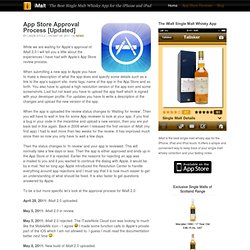

Buzzword Compliant » Apple App Approval Tips Nobody Told Me About. This includes rejections for: “Scraping” Content from 3rd party sitesNon official use of a 3rd party APIConcerns over handling of user data Now, while there is no checkbox for ‘I cross my heart and hope I’m not violating any treaties of the land’ during the app submission process there is a ‘Review Notes’ section where you can list any steps you’ve taken to remaining on the right side of the law.
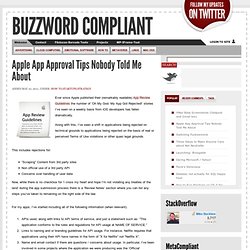
For my apps, I’ve started including all of the following information (when relevant): APIs used, along with links to API terms of service, and just a statement such as: “This application conforms to the rules and regulations for API usage at NAME OF SERVICE.”Links to naming and or branding guidelines for API usage. For instance, Netflix requires that applications using their API have names in the form of “X for Netflix” not “Netflix X”. Lastly, here is the (lightly redacted) text of the Review Notes section for Flickscan – Barcode Scanning for Netflix, which was approved first try.
Thanks! Here's Why It Really Sucks To Be An App Reviewer For Apple. Application Submission Feedback. 40 staffers. 2 reviews. 8,500 iPhone apps per week. Image: Apple Inc.
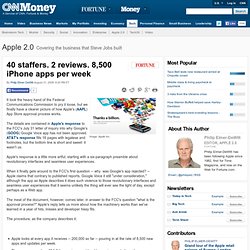
It took the heavy hand of the Federal Communications Commission to pry it loose, but we finally have a clearer picture of how Apple's (AAPL) App Store approval process works. The details are contained in Apple's response to the FCC's July 31 letter of inquiry into why Google's (GOOG) Google Voice app has not been approved. AT&T's response fills 16 pages with legalese and footnotes, but the bottom line is short and sweet: it wasn't us. Apple's response is a little more artful, starting with a six-paragraph preamble about revolutionary interfaces and seamless user experiences. When it finally gets around to the FCC's first question -- why was Google's app rejected?
The meat of the document, however, comes later, in answer to the FCC's question "what is the approval process? " The procedure, as the company describes it: Apple says its reviewers spend most of their time making sure the apps function properly and working with developers to fix bugs and quality issues. See also: How the App Store review process probably works – Whatever happened to Benjamin Ragheb? One of the most popular conversations to have on iPhone development mailing lists is, “How long has your app been waiting in review?”
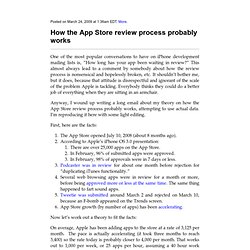
This almost always lead to a comment by somebody about how the review process is nonsensical and hopelessly broken, etc. It shouldn’t bother me, but it does, because that attitude is disrespectful and ignorant of the scale of the problem Apple is tackling. Everybody thinks they could do a better job of everything when they are sitting in an armchair. Anyway, I wound up writing a long email about my theory on how the App Store review process probably works, attempting to use actual data.
I’m reproducing it here with some light editing. First, here are the facts: The App Store opened July 10, 2008 (about 8 months ago). On average, Apple has been adding apps to the store at a rate of 3,125 per month. If each application review takes about an hour, you would need a staff of 25-30 testers to maintain this rate. But given that, the process hardly seems broken. What happens during the AppStore review process?
When an app that requires network connectivity is sent to Apple for a review, watching them review the app is straightforward.
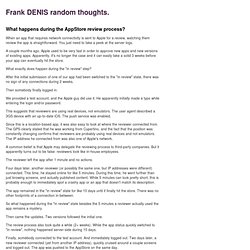
You just need to take a peek at the server logs. A couple months ago, Apple used to be very fast in order to approve new apps and new versions of existing apps. Apparently, it's no longer the case and it can easily take a solid 3 weeks before your app can eventually hit the store. What exactly does happen during the "in review" step? After the initial submission of one of our app had been switched to the "in review" state, there was no sign of any connections during 2 weeks.
Then somebody finally logged in. We provided a test account, and the Apple guy did use it. This suggests that reviewers are using real devices, not emulators. Since this is a location-based app, it was also easy to look at where the reviewer connected from. A common belief is that Apple may delegate the reviewing process to third-party companies. Then came the updates. Worst case scenario? While we are waiting for Apple’s approval of iMalt 2.0 I will tell you a little about the experiences I have had with Apple’s App Store review process.
